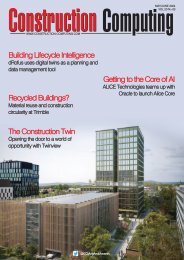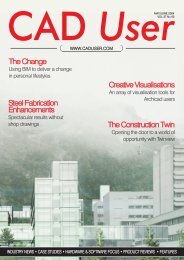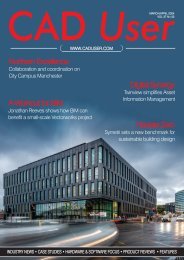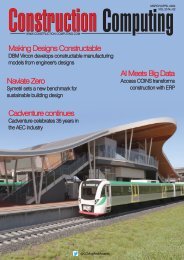CU Sep-Oct 2023
You also want an ePaper? Increase the reach of your titles
YUMPU automatically turns print PDFs into web optimized ePapers that Google loves.
TECHNOLOGYfocus<br />
OVERCOMING BARRIERS<br />
The construction industry has long<br />
been aware of the need to think<br />
sustainably, but we could lead the way<br />
in achieving net zero. These are the<br />
barriers to be overcome:<br />
1. Current processes<br />
Current manufacturing processes need<br />
to modernise and reduce their carbon<br />
footprints, faster.<br />
Everything - every product, every<br />
process in every part of the<br />
construction supply chain - needs to<br />
be carbon-rated. As the old saying<br />
goes, 'what gets measured, gets done'.<br />
A consistent rating system focuses<br />
minds, such as shown with the energy<br />
efficiency rating of electrical<br />
appliances.<br />
The government has committed to<br />
doing its bit to support this by<br />
supporting new methods to lower<br />
lifecycle emissions. However, this is an<br />
expensive process and suppliers need<br />
that government support.<br />
2. Delaying carbon efficiency<br />
Too often, when planning a building,<br />
some believe net zero targets aren't an<br />
issue, as the date to hit net zero<br />
targets feels too distant. Although<br />
targets may seem a long way away, we<br />
need to act now to ensure that our<br />
buildings - which we hope will last until<br />
well past 2050 - are able to meet the<br />
net zero targets.<br />
MAKING A DIFFERENCE<br />
It's all about making a difference, and<br />
making that difference now - which is<br />
why it isn't enough to wait for the<br />
government to support the sector or to<br />
step back from our responsibility. It's<br />
about constantly challenging our carbon<br />
impact to ensure the spaces we're<br />
creating are as sustainable as possible.<br />
That's why we should be changing the<br />
way we design buildings and the<br />
processes that create them, to<br />
maximise their overall carbon<br />
efficiency. This could include low<br />
carbon design features, such as green<br />
roofs or walls, to sequester carbon<br />
dioxide as well as improving overall<br />
insulation and absorbing excess<br />
rainwater during the building's lifecycle.<br />
It's time for the industry to<br />
acknowledge that climate change is<br />
here and that it has to be addressed<br />
now. However, changing the lifecycle of<br />
a building isn't enough, if the<br />
processes that underpin its<br />
manufacture don't use sustainable<br />
methods to ensure that the building<br />
has minimal embodied carbon.<br />
LEAN AND GREEN PROCESSES<br />
With 400 million tonnes of materials<br />
being used by the UK construction<br />
industry every year, it's more important<br />
than ever to prioritise processes that<br />
minimise waste, within manufacturing<br />
systems that minimise energy and<br />
material waste. Lean manufacturing a<br />
building dramatically cuts the total<br />
waste generated in its construction<br />
(including its installation).<br />
Manufacturing a building offsite<br />
radically reduces its carbon footprint<br />
when compared with traditional bricks<br />
and mortar methods, and handily<br />
maximises the industry's productivity in<br />
the process.<br />
Lean manufacturing defines waste as<br />
anything that customers don't believe<br />
adds value and aren't willing to pay for.<br />
Lean is all about examining every<br />
process to improve your product<br />
quality and efficiency, whilst boosting<br />
sustainability. That means lean is your<br />
dream solution - a way for you to<br />
satisfy your customers and reduce<br />
costs as you support net zero targets.<br />
To support lean and green processes,<br />
offsite construction has been<br />
independently recognised by the UK<br />
Green Building Council as playing a<br />
key role in reducing the carbon<br />
footprint of the UK's development<br />
sector. Manufacturing buildings offsite<br />
is the way to bring about a step<br />
change in construction: not just<br />
sustainability but also reduced waste,<br />
easier maintenance, tighter<br />
programmes and quality control.<br />
With processes that are designed to<br />
be streamlined and efficient, the<br />
amount of waste that goes to landfill is<br />
massively reduced and energy use is<br />
much easier to control and reduce in<br />
the factory setting. Modular buildings<br />
are also designed to be reused and<br />
recycled rather than demolished,<br />
hugely reducing the amount of energy<br />
that's necessary to construct a new<br />
building in the future.<br />
NET ZERO BUILDINGS<br />
If you want to join our challenge to the<br />
construction industry to create<br />
sustainable spaces to support a better<br />
tomorrow for generations to come,<br />
today visit www.netzerobuildings.co.uk<br />
or get in touch on: 01638 596 155.<br />
<strong>Sep</strong>tember/<strong>Oct</strong>ober 2022 31

















